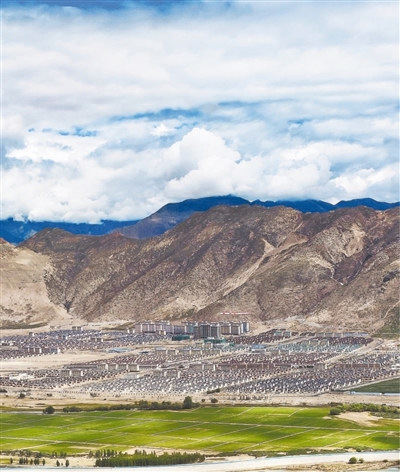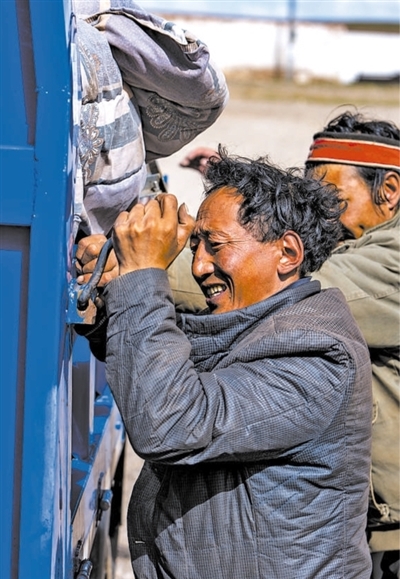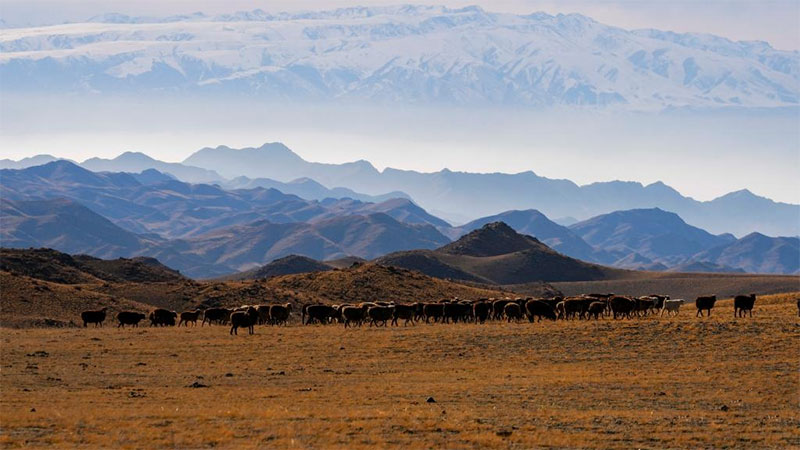SW China's Xizang relocates residents from extremely high altitude areas for better lives

Photo shows two students at Singpori Primary School in Gonggar county, Shannan city, southwest China’s Xizang Autonomous Region. (People's Daily/Xu Yuyao)
Southwest China's Xizang Autonomous Region is taking greater steps to ensure the lives and health of its people and protecting the local ecosystem by relocating residents from extremely high altitude areas.
In July this year, the autonomous region started moving over 13,000 residents from townships with an altitude of more than 4,800 meters in Tsonyi county, Amdo county and Nyima county of Nagqu city to Singpori, Gonggar county, Shannan city. The Singpori relocation site has an altitude of 3,600 meters and is not far from Lhasa Gonggar Airport in the regional capital Lhasa.

Photo shows buses carrying residents relocated from Tsonyi county of Nagqu city to the Singpori relocation site. (People's Daily/Xu Yuyao)
Xizang relocated the first batch of over 4,000 residents from high altitude mountainous areas with harsh environments in these three counties in 2019.
Penpa is a villager from Pangmer township of Amdo county, which is part of the Qiangtang Grassland. He boarded a bus together with other residents, and travelled over 500 kilometers to Singpori.
Penpa and his relatives and friends, who had been living in extremely high altitude areas for many years, had suffered from illnesses such as hypertension, arthritis and gout.

Workers at an apple orchard pick apples. (People's Daily/Xu Yuyao)
"In the past, many senior residents used to rent houses in places like Lhasa and lived there for a period every year to receive medical treatment and recuperate," Penpa said.
However, the decision to move was not easy for Penpa. The grassland is the place where he was born and grew up, and he has also raised over 100 yaks and about 300 sheep there.
But he knew that the grassland is a habitat for animals and its carrying capacity is limited due to the high altitude.
Thanks to years of conservation efforts, the Qiangtang Grassland has seen the ecology improve and the wild animal populations grow.

Photo shows the Singpori relocation site. (People's Daily/Xu Yuyao)
When Penpa arrived at the Singpori relocation site, he and his grandson Guru Wangyel were excited about the place and its rows of new residential buildings.
Penpa was allocated a two-story house with running tap water, electricity and internet access. His new home is close to Singpori Primary School, which is equipped with running tracks.
The local government has also developed industries such as apple planting at the relocation site to ensure that the relocated residents can enjoy happy and secure lives.
A dwarf rootstock apple orchard, opposite Penpa's new home, provides job opportunities for relocated residents. The first batch of apple trees planted in the orchard are expected to enter harvest next year.

Residents in Pangmer township, Amdo county of Nagqu city load their truck in preparation for relocation. (People's Daily/Xu Yuyao)

Photo shows Penpa, a villager in Pangmer township, and his grandson Guru Wangyel. (People's Daily/Xu Yuyao)
Photos
Related Stories
- Herdsmen in SW China's Xizang transfer livestock to autumn pastures
- Third China's Xizang Internet Photography & Video Festival: call for submissions
- Efforts made to ensure better livelihood for relocated residents in Guizhou province
- Yunhe county in Zhejiang develops wooden toy industry to deliver prosperous life to relocated rural residents
- Village in Yunnan embraces renewed vitality after implementation of relocation project
Copyright © 2022 People's Daily Online. All Rights Reserved.









